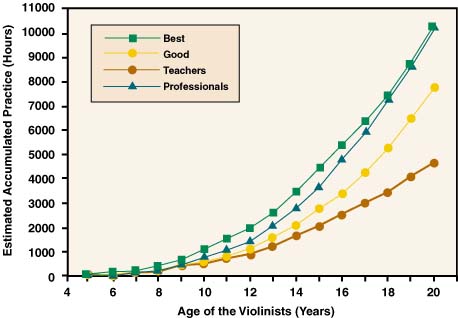No one would dispute that practice is an important component of achieving exceptional levels of performance in music, chess, sports and so on. But it is commonly assumed that both talent and practice are needed to achieve renown, where talent refers to some innate predisposition to make rapid advances in a particular field.
Yet evidence for the contribution of talent over and above practice has proved extremely elusive. In a recent study, Ericsson and his colleagues studied young pianists and violinists in their early 20s at the Music Academy of West Berlin, Germany. They asked the music professors to nominate the best young musicians, those who they thought had the potential for careers as international soloists, as well as others whose potential they regarded as not quite so great, and a third group who were most likely to become music teachers. Hence, in terms of achievement, the first group comprises the most exceptional musicians, the second group the next most outstanding, and the last group the least exceptional.
If “talent” is the primary factor, we might assume that these three groups differ in their innate giftedness for music and that this explains their different levels of achievement. If a person is innately gifted, then he or she can very rapidly attain an outstanding level of performance once the basic skills and knowledge required have been mastered. Yet Ericsson and his colleagues obtained a surprising finding: the best musicians had simply practiced more across their lives than the next best ones, who in turn had practiced more than the ones likely to become music teachers. Each of the musicians was asked to estimate approximately how many hours a week they had practiced each year since the outset of their musical training, and these estimates yielded cumulative totals of about 10,000 hours for the best musicians, followed by 8,000 for the next best ones and 5,000 for the least accomplished. The musicians also kept diaries for a week, recording their exact amounts of practice, and these yielded comparable differences, suggesting that the retrospective estimates were roughly accurate.
The estimate of 10,000 hours from this study is interesting because there is now abundant evidence across a range of abilities that roughly this much practice is needed to achieve international levels of performance. For instance, it has been estimated that about this many hours of practice is usually completed between the time of first learning the rules of chess and becoming an international master. Ericsson has argued that similar amounts of practice are seen in first-rate sportspeople, writers and scientists.
Two other lines of evidence converge on the conclusion that innate talents play a minimal role in the development of exceptional performance. First, if giftedness is important, then it ought to be the case that children identified at an early age as having high ability in a particular domain are exactly those children who go on later to achieve high levels of accomplishment. If a child learning the violin possesses an innate musical talent, this should be fairly evident as soon as the child begins playing the instrument. In contrast, if later ability is simply dependent on amount of accumulated practice, there should be little or no relationship between early signs of ability and later achievement.
To test these predictions, John Sloboda, Michael Howe and their colleagues at the Unit for the Study of Musical Skill and Development at the University of Keele, England, studied a large number of children between 8 and 18, some of whom were sufficiently good musicians to have won places at a selective music school. The remainder were divided into further groups of differing musical ability, with the least musical group comprising children who had been relatively unsuccessful in learning an instrument, most giving up after less than a year.
Sloboda, Howe and their colleagues then interviewed the parents of these young musicians and tried to find evidence for early signs of musical talent in those who later went to music school. Despite the range of musical ability in the three groups, almost no differences between them were found. … Only one characteristic, the age at which the children first sang, appeared significantly earlier in the most able group. However, even this is probably not evidence of innate musical ability, since these children experienced a greater degree of early musical input from their parents.
In a further study of their young musicians, Sloboda, Howe and their colleagues asked them to estimate how many hours of practice per day they had engaged in each year since taking up their instrument, just as Ericsson and his colleagues had done in their study. Since the musicians were regularly taking musical grade exams, Sloboda, Howe and their colleagues were able to use this as a measure of musical progress and could therefore calculate the amount of practice that took place between successive grades. The surprising result was that the most gifted children required just as much practice as the less gifted ones. Overall, then, there is little evidence that talent contributes to the achievement of exceptional levels of performance over and above practice.
CONCLUSION: To become an outstanding performer, one does not need an innate endowment of the right sorts of genes; instead, one simply needs to engage in deliberate practice for around 10,000 hours.
(Also see article on CNN.com.)

